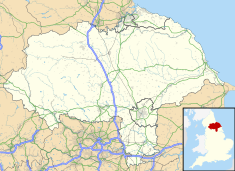Thornaby Town Hall is a municipal building in the Mandale Road in Thornaby-on-Tees, North Yorkshire, England. The building, which is owned by Thornaby Town Council, is a Grade II listed building.[1]
| Thornaby Town Hall | |
|---|---|
 Thornaby Town Hall | |
| Location | Thornaby-on-Tees |
| Coordinates | 54°33′30″N 1°18′10″W / 54.5583°N 1.3027°W |
| Built | 1892 |
| Architect | James Garry |
| Architectural style(s) | Renaissance style |
Listed Building – Grade II | |
| Official name | Former Town Hall |
| Designated | 9 October 1992 |
| Reference no. | 1320257 |
History
editIn anticipation of the proposed merger of Thornaby and South Stockton into the municipal borough of Thornaby-on-Tees municipal borough in 1892,[2] civic leaders decided to commission a dedicated town hall.[1] The site they selected was a developing area occupied by some clay pits in what had previously been close to the Mandale Marshes just south of South Stockton railway station.[3][4]
The foundation stone for the new building was laid by the chairman of the South Stockton local board of health, John Steel, on 25 October 1890.[5] It was designed by James Garry of West Hartlepool in the Renaissance style, built by W. C. Atkinson and was officially opened as Thornaby Town Hall in 1892.[1]
The design involved a chamfered main frontage at the junction of Mandale Road and Railway Terrace; the corner section featured a double window on the ground floor, an oriel window on the first floor and a clock tower with cupola and weather vane above.[1] The Mandale road elevation featured a doorway with brackets supporting an entablature and round headed windows with stained glass fanlights on the first floor; the Railway Terrace elevation had two bays with windows in a similar style to the Mandale Road elevation, but the bays further along the street displayed conventional sash windows on both floors.[1] However, Nikolaus Pevsner said that the town hall exhibited "a totally undistinguished design on a visually most unsuitable site", in his 1933 The North Riding (Buildings of England) book.[6] The quarter-chiming clock, which was made by Potts of Leeds[7] and donated by the first mayor of the town, Alderman William Anderson, was started on 27 January 1892.[5] Internally, the principal rooms were the council chamber and the mayor's parlour.[8]
The building continued to serve as the headquarters of Thornaby Borough Council for much of the 20th century but ceased to be the local seat of government when the short-lived County Borough of Teesside was formed in 1967.[9] It then remained largely unused, in the ownership of Stockton-on-Tees Borough Council from 1974, until Stockton Council decided to sell the building to a developer, Python Properties, in January 2010.[8] After the sale to Python fell through in May 2011,[10] Stockton Council carried out a consultation on its future use in September 2011.[11] The consultation resulted in Thornaby Town Council, which had been formed in 1995,[12] agreeing to acquire the building in May 2012[13] and completing the transaction in November 2012.[14]
An extensive programme of renovation works costing £900,000, funded by the National Lottery Heritage Fund,[15] was initiated by the town council in autumn 2017, with the intention that the works would act as a catalyst for further regeneration in the area.[16] After the actual cost of renovation exceeded the budget by £250,000, the town's mayor, Steve Walmsley, indicated in November 2019 that the extra cost would be recovered through council tax increases.[17]
References
edit- ^ a b c d e Historic England. "Former Town Hall (1320257)". National Heritage List for England. Retrieved 28 November 2020.
- ^ "Relationships / unit history of Thornaby-on-Tees". Archived from the original on 1 October 2007. Retrieved 28 November 2020.
- ^ "Ordnance Survey Map". 1860. Retrieved 28 November 2020.
- ^ Page, William (1928). "'Parishes: Stockton on Tees', in A History of the County of Durham". London: British History Online. pp. 348–365. Retrieved 28 November 2020.
- ^ a b "Thornaby Town Hall". Stockton Heritage. Retrieved 28 November 2020.
- ^ Pevsner, Nikolaus (1933). Yorkshire: The North Riding (Buildings of England). Yale University Press. ISBN 978-0300096651.
- ^ "Last chance to see inside Thornaby's derelict late Victorian town hall". Northern Echo. 21 February 2018. Retrieved 28 November 2020.
- ^ a b "Council angered by decision to sell town hall". Darlington and Stockton Times. 22 January 2010. Retrieved 28 November 2020.
- ^ Great Britain Historical GIS / University of Portsmouth, Teesside CB. Retrieved 28 November 2020.
- ^ "Does Thornaby Town Hall have a future?". Teesside Live. 26 May 2011. Retrieved 28 November 2020.
- ^ "Ideas wanted for future of Thornaby's historic Town Hall". BBC. 28 September 2011. Retrieved 28 November 2020.
- ^ "About Us". Thornaby Town Council. Retrieved 28 November 2020.
- ^ "Deal agreed for Thornaby Town Hall owner after 44 years". BBC News. 19 May 2012. Retrieved 28 November 2020.
- ^ "After years of legal wrangling and failed plans the future of Thornaby Town Hall finally looks secure". Northern Echo. 12 November 2012. Retrieved 28 November 2020.
- ^ "Thornaby Town Hall". National Lottery Heritage Fund. 4 December 2014. Retrieved 28 November 2020.
- ^ "Have you ever seen inside? Have a look around Thornaby Town Hall before £900k refurb". Teesside Live. 7 September 2017. Retrieved 28 November 2020.
- ^ "Thornaby Town Hall renovation costs force council tax rise". BBC. 30 November 2019. Retrieved 28 November 2020.
